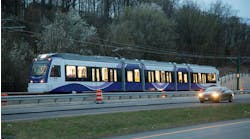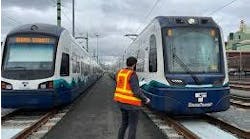Stadler lands pair of milestone contracts with MARTA, SBCTA
Stadler Rail is having a week - a really good week. The company will bring the first hydrogen-powered train to the United States through a contract with the San Bernardino County Transportation Authority (SBCTA) and it signed the single largest rail car order for both itself and the Metropolitan Atlanta Rapid Transit Authority (MARTA).
Under the agreement with SBCTA, Stadler will develop the hydrogen-powered FLIRT H2 for the U.S. The ordered vehicle consists of two cars with a power pack in between to hold the fuel cells and hydrogen tanks. The train is expected to have seating space for 108 passengers and is projected to travel at a maximum speed of 79 mph.
“Implementing innovative solutions like this first-of-its-kind passenger train is an excellent example of how we are demonstrating our commitment to the next generation in San Bernardino County,” said SBCTA President Darcy McNaboe. “The hydrogen FLIRT will help us address the commuting needs of today while preserving our environment for a better tomorrow.”
The train is expected to be in service in 2024 as part of the Redlands Passenger Rail Project, a nine-mile connector between Redlands and San Bernardino’s Metrolink station. The contract signed includes an option for four additional hydrogen-powered vehicles.
In Georgia, MARTA’s board of directors approved a $646-million agreement with Stadler Rail on Nov. 14 for the purchase of 254 new rail cars with options for MARTA to order up to 100 additional rail cars. MARTA notes that the order is the single largest rail car procurement for either organization and marks a milestone in the authority’s More MARTA investment plan.
While MARTA plans to engage customers to determine what custom components will be added to the fleet there will be some standard elements. Each new pair of cars will feature an open gangway design with modernized electronic signage and public address system, more comfortable seating plus handholds and stanchions with better functionality, two wheelchair positions, charging stations, luggage space and enhanced video surveillance. Additionally, the new rail cars will interface with other investments aimed at enhancing the customer experience such as MARTA’s new integrated operations center, new station audio-visual information upgrade, systemwide elevator and escalator upgrade, restroom modernization program and station rehabilitation program which will refresh MARTA stations.
During its 40 years of service, MARTA has procured rail cars in 1979, 1985 and 2003, but this order will be the first time older cars are retired from the existing fleet.
“We have consistently exceeded our on-time performance target goal of 95 percent, but we know that the age of our current fleet contributes heavily to the delays we experience,” said Jeffrey A. Parker, MARTA general manager and CEO. “About 65 percent of our delays are due to rail car reliability, and with rail transit being the cornerstone of our business, we aim to change that. The new fleet will reduce the number of unscheduled repairs associated with MARTA’s aging rail fleet, which ranges between 30 and 40-years old. A better customer experience in turn will increase ridership.”
A pilot car is expected to be delivered in 2022 followed by scheduled deliveries in 2023 and 2028.

Mischa Wanek-Libman | Group Editorial Director
Mischa Wanek-Libman is director of communications with Transdev North America. She has more than 20 years of experience working in the transportation industry covering construction projects, engineering challenges, transit and rail operations and best practices.
Wanek-Libman has held top editorial positions at freight rail and public transportation business-to-business publications including as editor-in-chief and editorial director of Mass Transit from 2018-2024. She has been recognized for editorial excellence through her individual work, as well as for collaborative content.
She is an active member of the American Public Transportation Association's Marketing and Communications Committee and served 14 years as a Board Observer on the National Railroad Construction and Maintenance Association (NRC) Board of Directors.
She is a graduate of Drake University in Des Moines, Iowa, where she earned a Bachelor of Arts degree in Journalism and Mass Communication.


